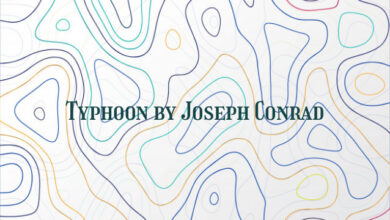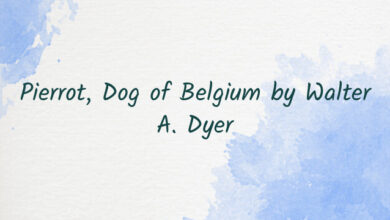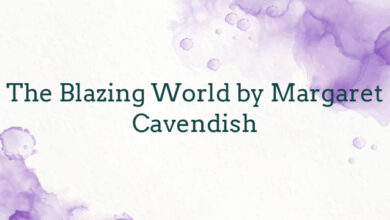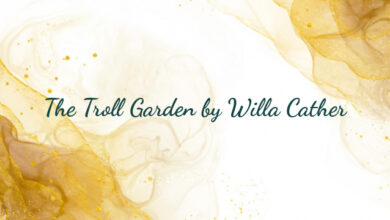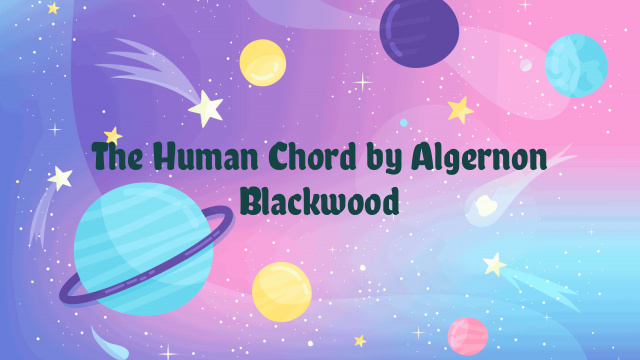
The Human Chord by Algernon Blackwood
Chapter 11
I
“And the color of my sound is a pale green,” he heard behind him in tones as sweet as a muted violin string, “while the form of my note fits into yours just like a glove. Dear Spinny, don’t tremble so. We shall always be together, remember, you and I….”
And when, turning, he saw Miriam at his side, radiant with her shining little smile of welcome, the relief was so great that he took her in his arms and would not let her go. She drew him tenderly away downstairs, for the clergyman, it seemed, was still busy with something in the room, and had left them….
“I know, I know,” she said softly, making him sit down beside her on the sofa, “I know the rush of pain and happiness it brings. It shifts the whole key of your life, doesn’t it? When I first went into my ‘room’ and learned the letter I was to utter in the Name, I felt as if I could never come back to ordinary things again, or–“
“What name?” interrupted Spinrobin, drawing sharply away from her, and the same second amazed at the recklessness that had prompted the one question he dreaded.
The inevitable reaction had come. He realized for the first time that there was an alternative. All the passion of battle was upon him. The terrific splendors of Skale’s possible achievement dazzled the very windows of his soul, but at the same time the sweet uses of normal human life called searchingly to him from within. He had been circling about this fight for days; at last it was unexpectedly upon him. He might climb to Skale’s impossible Heaven, Skale’s outrageous Heaven … on the wings of this portentous experience, or–he might sink back into the stream of wholesome and commonplace life, with a delicious little human love to companion him across the years, the unsoiled love of an embryonic soul that he could train practically from birth. Miriam was beside him, soft and yielding, ready, doubtless, to be molded for either path.
“What name?” he repeated, holding his breath once the words were out.
“The name, of course,” she answered gently, smiling up into his eyes. “The name I have lived to know and that you came here to learn, so that when our voices sing and utter it together in the chord we shall both become–“
Spinrobin set his mouth against her own to stop her speech. She yielded to him with her whole little body. Her eyes smiled the great human welcome as she stared so closely into his.
“Shall become–what we are not now,” he cried fiercely, drawing his face back, but holding her body yet more closely to him. “Lose each other, don’t you see? Don’t you realize that?”
“No, no,” she said faintly, “find each other–you mean–“
“Yes–if all goes well!” He spoke the words very low. For perhaps thirty seconds they stared most searchingly into each other’s eyes, drawing slightly apart. Very slowly her face, then, went exceedingly pale.
“If–all goes well” she repeated, horrified. Then, after a pause, she added: “You mean–that he might make a mistake–or–?”
And Spinrobin, drinking in the sweet breath that bore the words so softly from her lips, answered, measuring his words with ponderous gravity as though each conveyed a sentence of life or death, “If–all–goes–well.”
She watched him with something of that utter clinging mother-love in her eyes that claims any degree of suffering gladly rather than the loss of her own–passionately welcoming misery in preference to loss. She, too, had divined the alternative.
Then, kissing his cheeks and eyes and lips, she untied his arms from about her neck and ran, blushing furiously, from the room. And with her went doubt, for the first time–doubt as to the success of the great experiment–doubt as to their Leader’s power.II
And while Spinrobin still sat there, trembling with the two passions that tore his soul in twain–the passion to climb forbidden skies with Skale, and the passion to know sweet human love with Miriam–there came thundering into the room no less a personage than the giant clergyman, straight from those haunted rooms. Pallor hung about his face, but there was a light radiating through it–a high, luminous whiteness–that made the secretary think of his childhood’s pictures of the Hebrew prophet descending from Mount Sinai, the glory of internal spheres still reflected upon the skin and eyes. Skale, like a flame and a wind, came pouring into the room. The thing he had remained upstairs to complete had clearly proved successful. The experiment had moved another stage–almost the final one–nearer accomplishment.
The reaction was genuinely terrific. Spinrobin felt himself swept away beyond all power of redemption. Miriam and the delicious human life faded into insignificance again. What, in the name of the eternal fires, were a girl’s lips and love compared to the possibilities of Olympian achievement promised by Skale’s golden audacities? Earth faded before the lights of heaven. The whole tide of human emotion was nothing compared to a drop of this terrible salt brine from seas in unknown stars…. As usual Skale’s personality caught him up into some seventh heaven of the soaring imagination.
“Spinrobin, my glorious companion in adventure,” thundered the clergyman, “your note suits perfectly the chord! I am delighted beyond all words. You chime with amazing precision and accuracy into the complex Master-Tone I need for the proper pronunciation of the Name! Your coming has been an inspiration permitted of Him who owns it.” His excitement was profoundly moving. The man was in earnest if ever man was. “We shall succeed!” And he caught him in his arms. “For the Name manifests the essential attributes of the Being it describes, and in uttering it we shall know mystical union with it…. We shall be as Gods!”
“Splendid! Splendid!” exclaimed Spinrobin, utterly carried away by this spiritual enthusiasm. “I will follow you to the end–“III
The words were scarcely out of his mouth when framed in the doorway, delicate and seductive as a witch, again stood Miriam, then moved softly forward into the room. Her face was pale as the grave. Her little, delicate mouth was set with resolution. Clearly she had overheard, but clearly also she had used the interval for serious reflection.
“We cannot possibly–fail, can we?” she asked, gliding up like a frightened fawn to the clergyman’s side.
He turned upon her, stern, even terrible. So relentless was his swift appearance, so implacable in purpose, that Spinrobin felt the sudden impulse to fly to her assistance. But instantly his great visage broke into a smile like the smile of thunderous clouds when unexpectedly the sun breaks through, then quickly hides itself again.
“Everywhere,” he roared, “true things are great and clean…. Have faith… have faith….” And he looked upon them both as though his eyes would sweep from their petty souls all vestige of what was afraid and immature. “We all are–pure … we all are true … each calls his note in singleness of heart … we cannot fail!”
And just here Spinrobin, a little beyond himself with excitement probably, pattered across the room to his giant leader’s side and peered up into his visage. He stood on tiptoe, craning his neck forwards, then spoke very low:
“I have the right, we have the right–for I have earned it–to be taken now fully into confidence, and to know everything–everything,” came the words; and the reply, simple and immediate, that dropped back upon him through all that tangle of ragged beard was brief and to the point:
“You have. Listen, then–” And he led them both by the hand like two children towards the sofa, and then, standing over them, began to speak.IV
“I seek,” he said slowly and gravely, “the correct utterance of a certain mighty and ineffable name, and in each of those four rooms lies a letter of its first syllable. For all these years of research”–his voice dropped suddenly–“have only brought me to that–the first syllable. And the name itself is composed of four, each more mighty than the last.”
A violent trembling ran over both listeners. Spinrobin, holding a cold little hand in his, dreaded unuttered sentences. For if mere letters could spell so vast a message, what must be the meaning of a whole syllable, and what the dire content of the completed name itself!
“Yes,” Skale went on with a reverence born of profoundest awe, “the captured sounds I hold are but the opening vibrations of this tremendous name, and the task is of such magnitude that absolute courage and absolute faith are essential. For the sounds are themselves creative sounds, and the consequences in case of faulty utterance might be too appalling to contemplate–“
“Creative!” fell from the little man on the sofa, aghast at the possibility. Yet the one burning question that lay trembling just behind his lips dared not frame itself in words, for there was something in Mr. Skale’s face and manner that rendered the asking of it not yet possible. The revelation of the name must wait.
“Even singly, as you saw, their power is terrific,” he went on, ignoring the pathetic interruption, “but united–as we shall unite them while each of us utters his letter and summons forth the entire syllable by means of the chord–they will constitute a Word of Power which shall make us as Gods if uttered correctly; if incorrectly, shall pour from this house to consume and alter the surface of the entire world with the destructive tempest due to mispronunciation and a lie.”
Miriam nestled closer into her companion’s side. There was otherwise no sign outwardly of the emotions that surged through the two little figures upon the sofa.
“And now–now that you have this first syllable complete?” faltered a high and sharing tenor voice.
“We must transfer it to a home where it shall wait in silence and in safety until we have also captured the other remaining three.” Skale came forward and lowered his mouth to his companions’ ears. “We shall transfer it, as you now understand, by chanting the four letters. Our living chord will summon forth that first syllable into visible form and shape. Our four voices, thus trained and purified, each singing a mighty letter, shall create the astounding pattern of the name’s first syllable–“
“But the home,” stammered Spinrobin; “this home where it shall await the rest?”
“My rooms,” was the reply, “can contain letters only, for a whole syllable I need a larger space. In the crypt-like cellars beneath this house I have the necessary space all ready and prepared to hold this first syllable while we work upon the second. Come, and you shall see!”
They crossed the hall and went down the long stone passage beyond the dining room till they reached a swinging baize door, and so came to the dark stairs that plunged below ground. Skale strode first, Spinrobin following with beating heart; he held Miriam by the hand; his steps, though firm enough, made him think of his efforts as a boy when treading water for solid ground out of his depth.V
Cold air met them, yet it was neither dank nor unpleasant as air usually is that has never tasted sunlight. There was a touch of vitality about it wholly remarkable. Miriam pressed closer. Every detail, every little incident that brought them nearer to the climax was now interpreted by these two loving children as something that might eventually spell for them separation. Yet neither referred to it directly. The pain of the ultimate choice possessed them deep within.
“Here,” exclaimed the clergyman in a hushed tone that yet woke echoes on all sides, while he lit a candle and held it aloft, “you see the cellar vaults all ready for the first great syllable when our chord shall bring it leaping down from the rooms upstairs. Here will reside the pattern of the name’s opening syllable till we shall have accomplished the construction of the others.”
And like some august master of forbidden ceremonies, looking twice his natural size as the shadows played tricks with his arms and shoulders, merging his outline into walls and ceiling, Skale stood and looked about him.
Spaces stretched away on all sides as in the crypt of a cathedral, most beautifully and harmoniously draped with the separate colors of the four rooms, red, yellow, violet and green; immense gongs, connected apparently with some intricate network of shining wires, hung suspended in midair beneath the arches; rising from the floor were gigantic tuning forks, erect and silent, immediately behind which gaped artificial air-cavities placed to increase the intensity of the respective notes when caught; and in the dim background the clergyman pointed out an elaborate apparatus for quickly altering the temperature of the air, and another for the rapid production of carbonic acid gas, since by means of a lens of carbonic acid gas sound can be refracted like light, and by changing the temperature of the air that conveys it, sound can be bent, also like a ray of light, in any desired direction. The whole cellar seemed in some way to sum up and synthesize the distinctive characteristics of the four rooms. Over it all, sheeting ceiling and walls, lay the living and receptive wax. Singularly suggestive, too, was the appearance of those huge metal discs, like lifeless, dark faces waiting the signal to open their bronze lips and cry aloud, ready for the advent of the Sound that should give them birth and force them to proclaim their mighty secret. Spinrobin stared, silent and fascinated, almost expecting them to begin there and then their dreadful and appalling music.
Yet the place was undeniably empty; no ghost of a sound stirred the gorgeous draperies; nothing but a faint metallic whispering seemed to breathe out from the big discs and forks and wires as Skale’s voice, modulated and hushed though it was, vibrated gently against them. Nothing moved, nothing uttered, nothing lived–as yet.
“Destitute of all presence, you see it now,” whispered the clergyman, shading the candle with one huge hand; “though before long, when we transfer our great captured syllable down here, you shall know it alive and singing with a thousand thunders. The Letters shall not escape me. The gongs and colors correspond exactly. They will retain both the sounds and the outlines … and the wax is sensitive as the heart of a child.” And his big face shone quite dreadfully as the whole pomp and splendor of his dream come true set fire to his thoughts.
But Spinrobin was glad when at length they turned and moved slowly again up the stone steps and emerged into the pale December daylight. That dark cellar, wired, draped, waxed and be-gonged, awaiting its mighty occupant, filled his mind with too vast a sensation of wonder and anticipation for peace.
“And for the syllables to follow,” Skale resumed when they were once more in the library, “we shall want spaces larger still. There are great holes in these hills”–stretching out an arm to indicate the mountains above the house–“and down yonder in the heart of those cliffs by the sounding sea there are caverns. They are far, but the distance is of no consequence. They will serve us well. I know them. I have marked them. They are ready.”
He swept his beard to and fro with one hand. Spinrobin already saw those holes and caverns in the terms of sound and color.
“And–for the entire name–when completed?” he asked, knowing that the question was but a feeble substitute for that other one he burned to ask, yet dared not allow his lips to utter. Skale turned and looked at him. He raised his hands aloft. His voice boomed again as of old.
“The open sky!” he cried with enthusiasm; “the vault of heaven itself! For no solid structure exists in the world, not even the ribs of these old hills, that could withstand the power of that–of that eternal and terrific–“
Spinrobin leapt to his feet. The question swept from his lips at last like a flame. Miriam clung to his arm, trying in vain to stop him.
“Then tell me,” he cried aloud, “tell me, you great blasphemer, whose is the Name that you seek to utter under heaven … and tell me why it is my soul faints and is so fearfully afraid?”
Mr. Skale looked at him for a moment as a man might look at some trifling phenomenon of life that puzzled yet interested him. But there was love in his eyes–love, and the forgiveness of a great soul. Spinrobin, afraid at his own audacity, met his eyes recklessly, while Miriam peered from one to the other, perplexed and questioning.
“Spinrobin,” said the clergyman at length, in a voice turned soft and tender with compassion, “the name I seek–this awful name we may all eventually utter together, completely formed–is one that no living man has spoken for nigh two thousand years, though all this time the search has been kept alive by a few men in every age and every country of the world. Some few, they say–ah, yes, they say–have found it, then instantly forgotten it again; for once pronounced it may not be retained, but goes utterly lost to the memory on the instant. Only once, so far as we may know”–he lowered his voice to a hushed and reverent whisper that thrilled about them in the air like the throbbing of a string–“has it been preserved: the Prophet of Nazareth, purer and simpler than all other men, recovered the correct utterance of the first two syllables, and swiftly–very swiftly–phonetically, too, of necessity,–wrote them down before the wondrous memory had time to fade; then sewed the piece of parchment into his thigh, and hence ‘had Power’ all his life.
“It is a name,” he continued, his tone rising to something of its old thunder, “that sounds like the voice of many waters, that piles the ocean into standing heaps and makes the high hills to skip like little lambs. It is a name the ancient Hebrews concealed, as Tetragrammaton, beneath a thousand devices, the name, they said, that ‘rusheth through the universe,’ to call upon which–that is, to utter correctly–is to call upon that name which is far above all others that can be named–“
He paused midway in the growing torrent of his speech and lifted his companion out of the sofa. He set him upon his feet, holding both his hands and peering deep into his eyes–those bewildered yet unflinching blue eyes of the little man who sought terrific adventure as an escape from insignificance–
“–to know which,” he added, in a sudden awed whisper, “is to know the ultimate secrets of life and death, and to read the riddle of the world and the soul–to become even as itself–Gods.”
He stopped abruptly, and again that awful, flaming smile ran over his face, flushing it from chin to forehead with the power of his burning and tremendous belief.
Spinrobin was already weeping inwardly, without sound. He understood at last, only too well, what was coming. Skale’s expression held the whole wild glory, and the whole impious audacity of what seemed his blasphemous spiritual discovery. The fires were alight in his eyes. He stooped down lower and opened wide his capacious arms. The next second, Spinrobin, Miriam, and Mrs. Mawle, who had unexpectedly come upon them from behind, were gathered all together against his breast. His voice then dropped suddenly to a tiny whisper of awful joy that seemed to creep from his lips like some message too mighty to be fully known, and half lost itself among the strands of his beard.
“My wonderful redeemed children, notes in my human chord,” he whispered over their heads, “it is the Name that shall make us as God, for it is none other than the Name that rusheth through the universe”–his breath failed him most curiously for an instant–“the NAME OF THE ALMIGHTY!”
